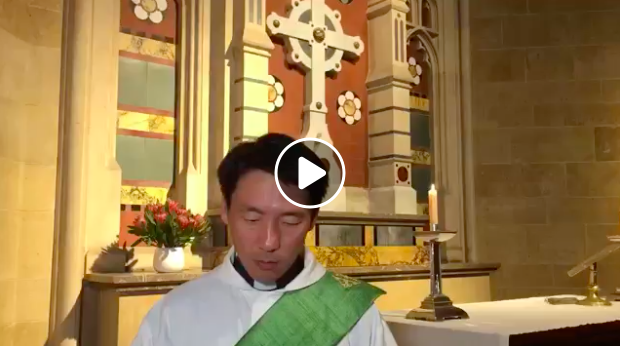A sermon by The Rev’d Peter Jin
In the name of the Father, and of the Son and of the Holy Spirit. Amen.
In today’s Gospel reading, Jesus says to his followers that ‘I have come to turn a man against his father, a daughter against her mother, a daughter-in-law against her mother-in-law.’ Is this the same Jesus who commands us to love our enemies in the sermon on the Mount? So why does Jesus proclaim such contradictory teaching?
Jesus calmed the storm, cast out unclean spirits, cured disease and sickness, so the crowds were amazed. More and more people were attracted to him and decided to follow him. Most of them had no idea what they were signing up for. The crowds were reading Jesus wrong. Jesus was celebrated as a miracle worker and a charismatic preacher. The people were following him as they would follow a pop star today. It is easy to follow Jesus when everything’s going great. But the question is: will we follow him to the very end? That’s the question today’s Gospel raises.
The 20th century German theologian, Dietrich Bonhoeffer gives us a wonderful phrase: ‘cheap grace’. A grace that doesn’t cost us anything or make any demands. The initial call to discipleship may come freely in grace, but the cost of discipleship is great, not cheap. Jesus asks us if we are willing to follow him all the way to the bitter end.
Can you imagine any religious founder who says the things that are in today’s Gospel? ‘Whoever loves father or mother more than me is not worthy of me, and whoever loves son or daughter more than me is not worthy of me’. I’m convinced that Jesus is not just one religious founder among many, not one prophet in the long line of the prophets. Jesus is the very incarnation of God, so he must be loved first and last. And everything else in our lives has to find its meaning in relation to him. That is it. That is the principle. It’s very easy to state this principle abstractly, but it’s the great struggle of life to live it.
In today’s Gospel reading, in typical Jewish fashion, Jesus makes a point through an exaggeration. He doesn’t demand us to push away those people who we are most inclined to embrace. He warns us against putting our dearest family member above God. Whenever we make what is pleasing to them of ultimate importance to us, whenever we make the achievement of their dreams the supreme value in our lives, this is when we begin treating our parents and our children as idols. They become so central to our own lives, and then God moves to a lesser place.
Fr. Richard Rohr reminds us that our life is not about us. His direction quote is ‘Your life is not about YOU’. It took me a long time to get my head around this counter-intuitive teaching. In recent years, I have been convinced that my life is not about me, or about my family. But it is about that higher power to which I belong. Friends, we belong to God. For all of us sinners, to varying degrees, our worldly lives can easily become an idol to us.
In our Gospel reading, Jesus is talking about the great spiritual principle of detachment. St. Ignatius called it indifference. It is the key to freedom.
The heart of spiritual life is to love God and then to love everything else for the sake of God. To get that right is to find the path. The 4th century theologian, Augustine of Hippo says that sinners fall into the trap of loving the creature, and in the process they forget their creator God.
I have to say St. Augustine is dead right. Looking back my teenage life till now, how many times I fell in love with pleasure, money, honour, whatever it was, I forgot or marginalised my creator. That was when I came off the rails. I treated something less than God as God, and trouble followed without doubt.
Friends, we must love God first, first, first, and then love everything else including our own lives in relation to God. Our lives will be joyful, in the measure that we surrender ourselves to God’s purpose.
I used to think that being a Christian to help me to be a better person. Yes, of course, the Christian journey involves moral reform, but friends, true conversion to Christ is so much more than moral reform. It has to do with a complete shift in consciousness and openness to a whole new way of looking at our lives.
Jesus goes on to say that, ‘whoever does not take up their cross and follow me is not worthy of me’. Those first century audiences knew that what the cross meant. It meant a death in utter agony, nakedness and humiliation.
What Jesus is saying here is that unless we crucify our egos, we cannot be his follower.
Friends, are we in the crowd of thousands following Jesus during the happy times, or are we prepared to follow Jesus all the way to the cross?





